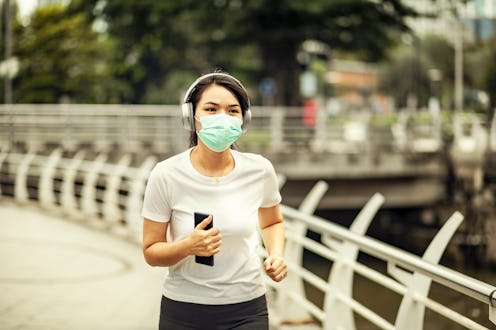Life
What To Know Before You Go For A Masked Walk, Run, Or Hike

You've exhausted YouTube of its kickboxing classes and you can't find kettlebells in stock online anywhere. As some cities begin to reopen select parks, you might be wondering if it's even safe to exercise outside right now.
"When facing a pandemic, the most important thing is to be smart and stay safe," says Mecayla Froerer, a certified personal trainer and director of at-home personal training community iFit Training. "Follow the guidelines that are laid out for your specific area and take the proper precautions when you are outside exercising and around others in public. If you want to be extra cautious, carrying around a small container of hand sanitizer wouldn’t hurt."
If your state requires people to wear masks in public, that will factor into your workout. "Depending on the mask thickness and material, it may make it more difficult to inspire and expire air while running," says Dr. Dennis Cardone, DO, a sports medicine specialist at NYU Langone Sports Health. "A wet mask may also cause it to become less effective at preventing transmission of virus particles. It is best to use the type of mask that is most comfortable to you while exercising and more important to practice social distancing," or staying at least six feet apart from others on your running route.
If you're going to keep your mask over your mouth and nose while you're exercising, be sure you're not feeling lightheaded and that you've taken extra care to hydrate. "Many cannot use one while working out because it inhibits breathing," Dr. Peter Gulick, D.O., an infectious disease expert at Michigan State University previously told Bustle.
"Homemade cloth masks, including bandanas and neck buffs, are sufficient when exercising outdoors," says Betsy Wagner, MPH, a clinical researcher and Strava athlete. "I prefer a mask that can tie at the top but have an open bottom, like a bandana, as that allows some ventilation around my chin and neck and feels a little more comfortable."
It's not just pandemic-specific safety you need to consider when making your outdoor exercise plan, says Steve Stonehouse, a certified personal trainer, track and field coach, and director of education for running studio STRIDE. While you might be used to the idea of "safety in numbers" when exercising outside, now all the advice is telling you to stay away from others. While following social distancing guidelines, however, you still might feel safer running if you're not alone. "It's definitely possible to run with a partner, spouse, or friend and still keep six to 10 feet from each other on the trails or road," Stonehouse tells Bustle.
Once you've found a safe spot in your neighborhood that tends to be low traffic (in terms of people and cars), it might help give you a sense of comfort and routine to make that spot your own, Froerer says. "Create a space in your home, backyard, or neighborhood that is dedicated to exercise," she tells Bustle. "By knowing where you’ll go each day to work out, you can help eliminate many potential distractions. Having this space will also help you get in and stay in the right mindset by setting the tone for your workout."
Even if you already have an outdoor exercise routine, it's still important to recognize the differences that social distancing will have on your emotional and workout game. You can't run with your running group anymore, and you might not be able to access your favorite trail either, says Liz Crafford, a coach at Mile High Run Club, a treadmill fitness studio in NYC. That loss of social structure and routine can wreak havoc on your running plans and motivation levels, but that doesn't mean you have to push yourself twice as hard.
"In the midst of a global pandemic, it's not necessarily the time we need to be challenging ourselves," says Allie Buchalski, a runner with the Brooks Beasts. "We need to be taking the best care of ourselves that we can, and part of that is going to be an exercise routine that might include running some days and not running on other days, depending on how you feel."
If all of these changes and constraints to your outdoors workout feel too anxiety-provoking or make you think too much about the state of the world right now, it's OK to retreat from it all. "Physical fitness is not always the most important," Crafford tells Bustle. "It's also your mental health, as well."
Experts:
Mecayla Froerer, certified personal trainer, director of at-home personal training community iFit Training
Dr. Dennis Cardone, DO, sports medicine specialist at NYU Langone Sports Health
Betsy Wagner, clinical researcher with a Masters in public health, Strava athlete
Steve Stonehouse, certified personal trainer, USATF coach, and director of education for STRIDE
Liz Crafford, coach at Mile High Run Club, certified VDOT and RRCA running coach
Allie Buchalski, runner with Brooks Beasts
This article was originally published on